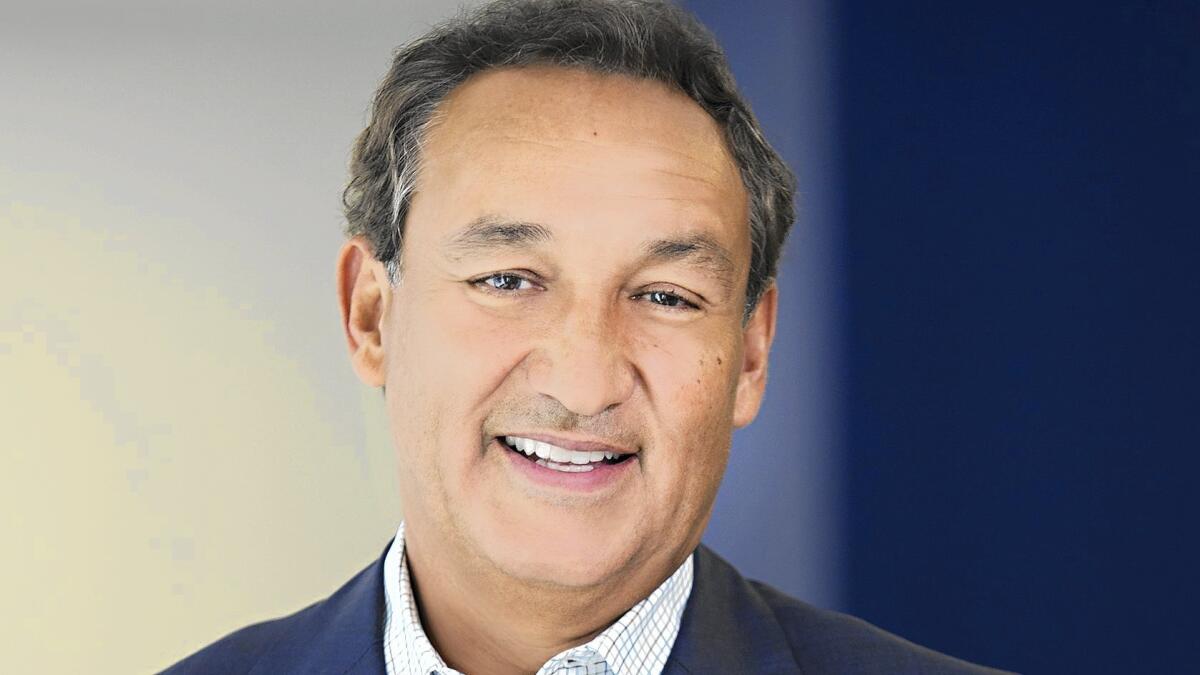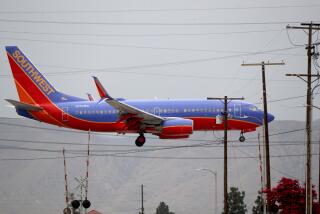Column: Two months after a heart transplant, airline wants him back at work -- or else

Oscar Munoz will return to work at United Airlines next week, two months after a heart transplant.
- Share via
If you had to undergo a heart transplant, chances are you’d be in no hurry to get back to work — if a return was even possible.
Now consider the situation of Oscar Munoz, chief executive of United Airlines. The carrier proudly announced this week that he’ll be back on the job Monday, just two months after having a new heart sewn into his chest.
United made it seem like Munoz’s comeback is some kind of medical marvel, and maybe it is.
But a regulatory filing submitted by the company the day after Munoz’s surgery made clear that the airline may not be as magnanimous as all that. It said Munoz would be behind his desk — or else.
Discuss this story on our Facebook page >>
The opaquely written document states that if he puts in six straight months at the office, he’ll get a bonus of $10.5 million. If he spends too long recuperating, he’ll lose millions, and maybe even his job.
“United is saying here that if he returns to work quickly, he gets rich,” said Kevin Murphy, an executive-compensation expert at USC’s Marshall School of Business who reviewed the filing with me. “If he doesn’t, he gets relatively little.”
Now that’s what I call tough love.
Munoz’s position raises interesting questions about a company’s moral responsibility toward employees at a time of corporate crisis — not to mention the vast gap that exists between the experiences of CEOs and ordinary workers.
“If United cared more about his personal welfare, the company would likely insist that he take a longer leave of absence,” Murphy said. “Professional athletes, for example, return to work far too early after injuries, risking their careers and even their lives.”
Munoz, 57, made no mention of his health in a statement this week. “I am thrilled to return full-time to a job and the employees I love,” he declared.
He hasn’t been in love for long. Munoz joined United as CEO in September. A month later, he suffered a major heart attack.
This was troublesome for United for any number of reasons, not least because the company was desperate to show it had a strong leader at the helm.
Munoz’s predecessor, Jeff Smisek, stepped down amid a federal probe into United’s questionable dealings with the former head of the Port Authority of New York and New Jersey. The carrier had reinstated a money-losing route that just so happened to cut travel time to the transit official’s South Carolina vacation home.
United also received the dubious distinction last year of being the lowest-ranked major airline for customer satisfaction. Only budget carriers Frontier Airlines and Spirit Airlines had worse scores.
The day after Munoz’s Jan. 6 heart transplant, United told investors that the company expects him to “resume the role of president and chief executive officer ... at the end of the first quarter or the beginning of the second quarter of 2016.”
The first quarter isn’t up until the end of this month, so Munoz’s return to work Monday represents exceptional fortitude.
Or does it?
In its filing, United spelled out what’s at stake. If Munoz puts in a full year’s work, he’ll receive a base salary of $1.25 million plus a signing bonus of $5.2 million. He’ll also be eligible for an annual performance bonus of at least $3.75 million.
But what stands out in the filing in light of Munoz’s health issues is a $10.5-million “long-term incentive award.” United specifies that he’ll only be eligible for the big bucks if he’s “in continuous active service as president and chief executive officer for a period of six months.”
Murphy said there’s no mistaking the intent of that language.
“That six-month thing is clearly giving Munoz a strong incentive to be back at the firm,” he said. “If he doesn’t work six straight months, he doesn’t get the money.”
Just in case that didn’t turn the screws hard enough, United’s filing says Munoz can be sacked if he misses 180 days of work because he’s “physically incapable of performing the material duties as president and chief executive officer.”
And should he quit because of disability, he’ll only be paid for the relatively brief time he was on the job and will forgo “any annual, long-term or other incentive award” that required longer service.
So here we are, two months after his heart transplant, and Munoz is set to dive back in to running one of the world’s biggest airlines. Is that unusually quick?
I spoke with half a dozen cardiologists. The consensus was that two months is pretty darn speedy, but it’s not unheard of.
“Two months is very fast,” said Dr. Morton Kern, a cardiologist at UC Irvine and the Long Beach Veterans Affairs Medical Center. “If I was a heart-transplant patient, I’d wait six months, a year, before going back to work.”
Dr. Sean Pinney, director of heart transplants at Mount Sinai Hospital in New York, agreed that “two months is a rather quick time to return to work.” But he said that “we encourage all patients to try and return to work assuming that the physical demands of work are not too great.”
Being a CEO may not be as physically demanding as playing football, but it can require epic hours, little sleep and, in Munoz’s case, a lot of flying. Then there’s the stress.
It was reported this week that dissident shareholders want to shake up the board and install former Continental Airlines CEO Gordon Bethune as United’s chairman to oversee Munoz’s performance.
A United spokesman declined to elaborate on Munoz’s situation or his compensation package.
It would be inhumane to wish Munoz anything but the best. But you’ve got to wonder if he’s got his priorities straight.
We all talk about how our jobs are killing us. That sentiment takes on extra weight in Munoz’s case.
“If it were me,” said David Lewin, a professor emeritus at the UCLA Anderson School of Management, “I’d have gone off to the Caymans.”
All things considered, even with millions of dollars on the line, me too.
David Lazarus’ column runs Tuesdays and Fridays. He also can be seen daily on KTLA-TV Channel 5 and followed on Twitter @Davidlaz. Send your tips or feedback to [email protected].
ALSO
How the 1981 assassination attempt changed Nancy Reagan
Brentwood neighbors want city to punish landowner over tree removal
Aiming to drive down gun deaths? Put these three laws on the books, researchers say
More to Read
Inside the business of entertainment
The Wide Shot brings you news, analysis and insights on everything from streaming wars to production — and what it all means for the future.
You may occasionally receive promotional content from the Los Angeles Times.











